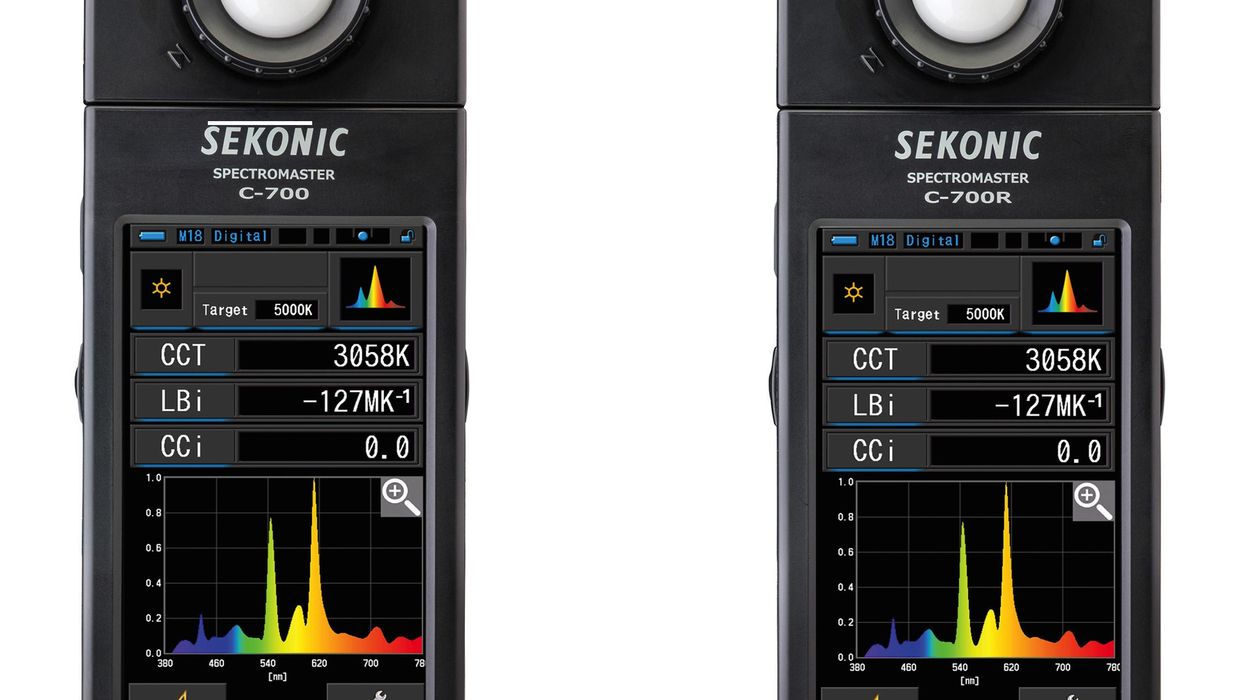Sekonic C-700 & C-700R SpectroMaster Spectrometer Gives You Total Control of Color On Set
If you're trying to measure the color output of a light source, you're going to need a spectrometer like the Sekonic C-700 & C-700R SpectroMaster.

DISCLOSURE: This is a sponsored post by Sekonic.
You're probably familiar with light meters, which measure light output and display exposure settings for your camera. A spectrometer reads only the color of a light, and opens up a whole new world of control on set. If you're using different light sources while shooting, like Tungsten, LED, and HMI, and different brands within those sources, making them color match precisely can be a pain. You can take an educated guess with filters, but a spectrometer like the C-700 series will let you know exactly what color temperature your light source is, and then give you the filter you need to correct it, right down to the brand name and filter number.
Features
This is important for narrative work, but it can be especially important when you're dealing with visual effects or green screen, and you want to make sure you know what your light sources are doing.
But that's not all. While Daylight and Tungsten are continuous light spectrum sources, other types of lighting, like LED and Fluorescent, can have gaps and spikes in their spectrum:
Using the C-700 & C-700R, you can measure the CRI (color rendering index) and special CRI of a given light source, telling you how closely a source accurately reproduces different colors. If you're wondering why things are a little off, or you're trying to compare different brands of technology, you can use the spectrometer to get an accurate reading and know precisely where your light source stands.
Specifications
Check out a snippet of the C-700 Series specifications (the C-700R has wireless flash triggering):
- Uses CMOS Sensor and Linear Variable Filter
- Measures Flash, LED, HMI, Fluorescent, Plasma
- Measures Tungsten, Natural Light
- Reads Color Temp. from (1,600-40,000K)
- Reads 0.09 to 18,600 fc (1-200,000 lux)
- Large, 4.3" Color Touchscreen
- Displays Color Spectrum Graph, CRI
- Displays Rosco, Lee, Fuji, Wratten Filter Values
- Multiple Light Comparison
- 100' PocketWizard Triggering Range (C-700R only)
- Price: $1,499 for C-700 & $1,699 for C-700R
And the full specifications (click for larger):
Comparing Light Sources
The beauty of the C-700 series is how easily you can compare light sources. First, here's how single light sources are measured on the C-700/R:
And here's how it looks when you're comparing multiple light sources:
Software
The C-700 series also comes with handy software, which you can use to store different light sources for future reference, and even compare the same light over time to see how its color is changing with age:
With a spectrometer, you never have to guess what your lights are doing. The C-700 & C-700R SpectroMaster will help ensure that you can match any lights on set, and that there aren't any surprises once you get into post-production.
Read more about both meters over at the links below.
Sekonic C-700 SpectroMaster
Sekonic C-700R SpectroMaster
You can purchase the Sekonic C-700 & C700R at resellers like B&H.
DISCLOSURE: This is a sponsored post by Sekonic.



















